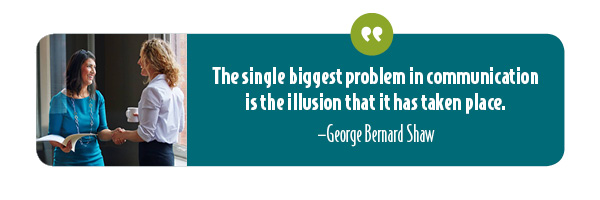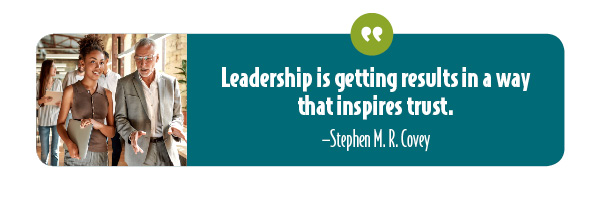Do you find yourself having to repeat a little too often in the workplace, “Remember, we discussed that in our meeting on Monday”? Or someone’s memory of an interaction is totally different from yours. If so, poor communication could be the culprit.
Effective communication is a two-way street, not a cul-de-sac. It’s about connecting. Talking with someone is different from talking at someone or quick instructions as you fly out the door for a meeting. Many people, especially executives, feel they communicate clearly but then get frustrated by having to repeat themselves or not achieving the results they want. They often don’t realize (or don’t remember) what it feels like to be on the receiving end of their messages.

Why Effective Communication Is Important in the Workplace
It can be an uncomfortable feeling for all parties when there has been a communication breakdown, which often results in unnecessary mistakes, delayed projects, or loss of production. When these breakdowns occur, however, perception is reality. And since individual personalities and past conditioning create perspective, each reality is a well-guarded, private universe. Both parties may seek to determine who’s right rather than develop solutions to communicate better in the future. These unresolved feelings foster resentment and more miscommunication. A build-up of festering conflicts in work relationships prevents healthy, productive, creative working relationships.
Effective leadership and communication skills are essential for healthy business relationships, team building, and employee engagement, which results in higher profitability.

Communication and the Emotional Intelligence Factor
Robert K. Cooper, Ph.D. said, "Emotional intelligence is the ability to sense, understand, and effectively apply the power and acumen of emotions as a source of human energy, information, connection, and influence."
Notice the words “understand” and “apply” in the above quote. The key to emotional intelligence (or EQ) is a person’s awareness of his/her own emotions and the ability to use that awareness in life and work situations. If you cannot recognize and understand your feelings, then how are you going to be able to connect and read the needs and subtle communication cues of your team? As noted in Entrepreneur, self-awareness, natural connect-ability, and charisma are the hallmarks of successful leaders; it makes people want to be a part of what they are doing.

Leadership and Workplace Emotional Intelligence
Emotional intelligence is no longer negotiable in today's workplace—it's critical. The leaders that fail lack people skills.
Leaders with a high level of emotional intelligence can:
- Galvanize and maximize a talented workforce.
Business leaders are generally highly motivated. With emotional intelligence, they can approach obstacles with resilience and infectious optimism. They empower employees with courageous leadership, encouraging their employees to utilize their talents and be their best. - Handle conflicts with diplomacy.
Emotionally intelligent leaders are empathetic. They can emotionally relate to others and understand their needs while also wisely acting in the best interest of the company. They know how to quickly diffuse disagreements and find common ground. - Control their emotions and provide effective feedback.
When conflict arises, emotionally savvy leaders can modulate their emotions while reflecting on the role they may have played in a miscommunication. They listen and seek to understand another’s perspective, which provides a safe space for open dialogue. Leaders and managers with high EQ also know how to receive feedback as well as give timely and helpful feedback to their employees. - Create a personal connection with the workforce.
Leaders with EQ take time to engage their employees. They’re interested in their lives on the job and outside of the workplace. As a result, employees feel cared for and valued; this support helps team members achieve a healthier work-life balance. - Make tough decisions swiftly.
A hallmark of emotionally fit leaders is their ability to make the hard calls, even if people get upset. Their vision allows them to see what others miss. Instead of delaying difficult decisions, careful preparation, and strategic communication preserve trust in these situations.
Related Article: "How to Give Feedback Effectively for the Best Results."
Ways to Improve Communication at Work: the Strategy of Trust
How we communicate in our work environments influences the quality of our working relationships, teams, and leadership.
It is trust that either builds good communication or the lack thereof that destroys it.
Think of a work relationship where there is tremendous trust. Do you have to choose your words carefully, or do you just let them flow? Are you often misunderstood or is there a meeting of minds, an effortless connection? Trust creates ease. With a heightened trust relationship, even if you blurt out something slightly harsh or inappropriate, the person cuts you slack. And somehow, they understand your meaning without you having to justify your position.
 However, if the relationship is strained or lacks trust, no matter how perfect you communicate, no matter how well you articulate or carefully choose your words, the person will misinterpret, distort the experience, and react.
However, if the relationship is strained or lacks trust, no matter how perfect you communicate, no matter how well you articulate or carefully choose your words, the person will misinterpret, distort the experience, and react.
When there is a breakdown in communication or a reoccurring conflict with a fellow employee, check in on the trust factor. Have you recently done anything to disrespect or undermine the relationship? If so, repair it.
Make a deliberate effort to invest in the person’s emotional bank account. Get curious about their perspective. Sincerely value their opinions and commend their contributions. Building trust doesn’t require big, dramatic strokes; credibility strengthens through small, consistent gestures of respect and integrity.

In Effective Communication, the “EYES” Have It
I once had a supervisor who would give me long-winded directives while hovering over my shoulder. He never locked eyes with me when explaining instructions; his body language and impatience were very unsettling. He frequently gave me the sense that he had more important things to do. As a result, I missed large chunks of his communications. I’d keep checking behind me to make sure he was talking to me.
As expressed in Fast Company, the simple act of making eye contact and having positive body language as a leader or an employee can:
- Promote connectedness.
- Demonstrate active listening.
- Convey mutual respect and confidence.
- Increase employee engagement.
- Help prevent or mitigate conflict.
Maintaining friendly eye contact and positive, open body language says, “I’m listening. I respect you. I value your input and ideas.” A simple but essential way to increase trust.
Effective communication is the bedrock of a successful business and thriving workplace culture.
Ready to boost your business by optimizing your leadership? Is it time to enhance your team’s communication skills? Contact Heartmanity to sign up for one of our customized training options.








